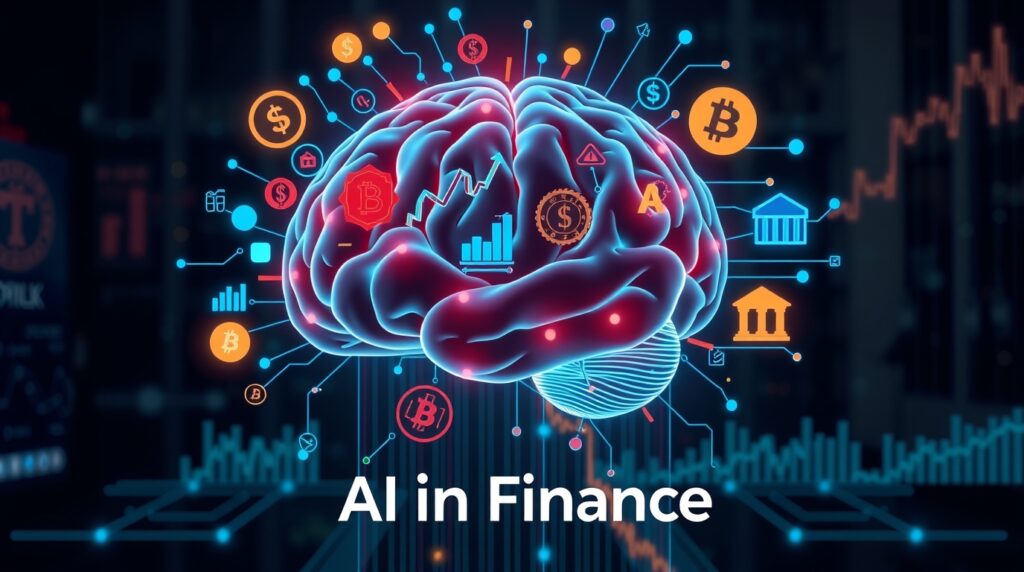Introduction
AI in Finance: The financial sector is undergoing a rapid digital transformation, and artificial intelligence in finance industry is at the heart of this change. From AI in accounting and finance to AI in banking and wealth management, intelligent algorithms are reshaping how financial institutions operate, improve efficiency, reduce fraud, and deliver personalized customer experiences. Banks are implementing AI on their Loan Apps.
This in-depth article explores using AI in finance, answers key questions like “How can AI be used in finance?”, discusses the role of explainable AI in finance, and evaluates whether AI financing is safe. We will also highlight leading AI-powered financial software and apps, making this guide a valuable resource for both the USA and Indian financial ecosystems. Now people are making their career in AI.
What is Artificial Intelligence in Finance or AI in Finance?
Artificial Intelligence in finance refers to the use of machine learning (ML), natural language processing (NLP), predictive analytics, robotic process automation (RPA), and neural networks to analyze data, detect patterns, automate processes, and assist decision-making in the financial industry.

Key Benefits of AI in Finance:
- Data-Driven Decision Making – AI can analyze massive amounts of structured and unstructured data faster than humans.
- Risk Management – Predictive models identify risks and prevent fraud.
- Process Automation – Reduces manual work in accounting, auditing, and reporting.
- Cost Savings – Automating repetitive tasks lowers operational costs.
- Enhanced Customer Experience – Chatbots and virtual assistants provide 24/7 support.
How Can AI Be Used in Finance?
A critical question in the industry is “how can AI be used in finance?” Here are the main applications:
1. Fraud Detection & Risk Management
Banks and financial institutions use AI to analyze transactions in real time, identifying anomalies and reducing fraud.
2. Credit Scoring & Loan Approvals
AI algorithms assess creditworthiness using alternative data such as social behavior, payment history, and spending patterns.
3. Algorithmic Trading
AI models process vast amounts of market data to make real-time trading decisions. Hedge funds, stockbrokers, and retail investors are increasingly relying on AI in trading systems.
4. Personalized Financial Services
AI-driven robo-advisors (like Betterment and Wealthfront) recommend investments based on individual risk profiles.
5. Customer Support with AI Chatbots
AI-powered chatbots answer financial queries, assist with banking services, and improve client engagement.
6. Compliance & Regulatory Reporting
AI automates compliance processes, reduces errors, and ensures regulatory adherence.
AI in Accounting and Finance
AI in accounting and finance is transforming how companies handle bookkeeping, auditing, and reporting.
- Automated Data Entry: AI tools like Xero and QuickBooks AI eliminate manual entry.
- Expense Management: AI helps classify and track expenses in real time.
- Auditing: Predictive analytics reduces human bias in financial audits.
- Forecasting & Budgeting: AI provides accurate projections for future financial planning.
👉 Example: KPMG and PwC already use AI-powered auditing platforms to improve transparency and speed.

AI in Banking and Finance
Banks are at the forefront of AI adoption.
- Fraud Prevention: Companies like Mastercard use AI to prevent fraudulent transactions.
- Risk Assessment: AI models assess financial risk before loan approval.
- AI Credit Models: Traditional banks are adopting machine learning for lending decisions.
- Wealth Management: Personalized AI-driven advisory services help customers grow assets.
- Customer Experience: AI-powered mobile apps provide personalized banking insights.
How Finance Teams Can Succeed with AI
AI in Finance: For finance professionals, adopting AI requires strategic planning.
Steps for Finance Teams:
- Upskill Employees – Training in AI tools and data analytics.
- Adopt Explainable AI (XAI) – Transparency in AI decisions ensures regulatory compliance.
- Collaborate with Tech Teams – Finance and IT must work together.
- Leverage AI for Insights – Use predictive analytics for forecasting.
- Ensure Data Privacy – Implement strong governance frameworks.
Explainable AI in Finance
A major challenge is the “black-box” nature of AI. Financial regulators demand transparency, making explainable AI in finance critical.
- Explainable AI (XAI) provides clear reasoning behind predictions.
- Helps banks and auditors justify decisions in lending, credit scoring, and risk assessment.
- Builds trust with customers and regulators.
Is Financing Safe with AI?
A common question is: “Is financing safe in AI?” or “Is AI financing safe?”
The Answer is Yes, but with precautions. AI enhances security in transactions by detecting fraud, improving compliance, and reducing risks. However, safety depends on:
- Data privacy policies
- Algorithm transparency
- Cyber security protections
Governments in the USA and India are introducing AI regulations in finance to ensure safe and ethical use.
AI-Powered Financial Software and Apps
Here’s a list of leading AI in finance software and apps:
Banking & Finance AI Apps
- Kasisto – AI chatbot for banking.
- ZestFinance – AI-based credit risk analysis.
- Upstart – AI-powered personal loans.
- Darktrace – Cybersecurity for financial institutions.
Accounting AI Software
- QuickBooks AI – Automated bookkeeping.
- Xero – AI for expense management.
- Botkeeper – AI-based accounting assistant.
- Vic.ai – Automates invoice processing.
Trading & Investment AI Tools
- Kavout – AI-powered trading signals.
- Numerai – Hedge fund powered by crowdsourced AI models.
- Betterment & Wealthfront – Robo-advisors for personal investment.
- AlphaSense – AI for financial market research.
Why Adopt AI-Powered Financial Software and Apps?
The adoption of AI-powered financial software and apps is no longer optional—it’s becoming essential for businesses, banks, and individual investors. Here’s why:
1. Automation of Repetitive Tasks
AI can automate time-consuming processes such as bookkeeping, invoicing, expense tracking, and payroll. Tools like QuickBooks AI, Xero, and Botkeeper reduce human error and free up finance teams to focus on strategic decision-making.
2. Enhanced Accuracy and Efficiency
AI algorithms analyze large volumes of financial data in real time, providing precise forecasts, detecting anomalies, and improving reporting accuracy. This leads to faster decision-making and more reliable financial insights.
3. Improved Risk Management
AI can predict potential financial risks, fraud, or market volatility using predictive analytics. Banks and fintech companies use AI to monitor suspicious transactions, credit risks, and investment opportunities.
4. Cost Savings
By reducing manual labor and optimizing processes, AI cuts operational costs significantly. Smaller finance teams can achieve the output of larger teams, making financial operations leaner and more scalable.
5. Personalized Financial Services
For individuals, AI apps like Wealthfront, Betterment, and Upstart provide personalized investment advice, portfolio management, and loan recommendations based on your unique financial profile.
6. 24/7 Availability and Support
AI-powered chatbots and virtual assistants provide real-time support, answering queries, guiding transactions, and assisting customers round-the-clock.
7. Future-Proofing Finance Operations
Adopting AI ensures that finance teams and institutions stay competitive in an increasingly digital economy. AI-powered systems adapt to regulatory changes, market trends, and emerging technologies.
AI-powered financial software and apps offer efficiency, accuracy, and intelligence that traditional systems cannot match. From automation to risk management, predictive insights, and personalized advice, adopting AI in finance ensures smarter, safer, and faster financial operations, making it a strategic necessity for businesses and individuals alike.
Future of AI in Finance: USA & India Outlook
- In the USA, AI adoption is driven by Wall Street, fintech startups, and big banks.
- In India, AI is expanding in UPI transactions, mobile banking apps, NBFCs, and stock trading.
- Global AI in finance market is projected to reach $61 billion by 2031.
Trends to Watch:
- Generative AI in Finance – AI creating financial reports, summaries, and insights.
- Blockchain + AI – Secure financial transactions.
- AI-driven ESG Investments – AI to track environmental and social governance investments.
- Digital Banks with AI-first Approach – Neo-banks leveraging AI completely.
AI in Trading and Investment
Artificial intelligence in trading and investment is revolutionizing financial markets by enabling faster, data-driven decision-making. Using machine learning, predictive analytics, and natural language processing (NLP), AI systems can analyze millions of market data points in real time, identifying patterns and trends that humans might miss.
Algorithmic trading is one of the most common AI applications. AI algorithms can execute trades at optimal prices, reduce human error, and adjust strategies based on market volatility. Hedge funds, investment banks, and retail investors increasingly rely on AI-powered trading platforms to gain a competitive edge.
AI also plays a significant role in portfolio management. Robo-advisors like Betterment and Wealthfront use AI to recommend investment strategies tailored to individual risk profiles and financial goals. AI tools monitor market fluctuations, rebalance portfolios, and provide personalized investment insights.
Furthermore, AI in risk management helps traders predict potential losses, evaluate market exposure, and comply with regulatory requirements. With these capabilities, investors can make informed, timely, and safer decisions.
As AI technology advances, its impact on trading and investment continues to grow, making financial markets more efficient, transparent, and accessible to both professionals and retail investors.

Banks and Financial Sectors Using AI
AI in Finance: Many leading banks and financial institutions worldwide are integrating artificial intelligence (AI) to streamline operations, improve customer service, and enhance decision-making. Find the below list of banks and financial sectors who have already adopted ‘AI in Finance‘ concept and started working on it.
Major Banks Implementing AI
- JPMorgan Chase
JPMorgan Chase has equipped its workforce with AI-powered tools, including large language models (LLMs) developed with OpenAI and Anthropic, to improve productivity and support data-driven decisions. - Goldman Sachs
Goldman Sachs launched the GS AI Assistant, a generative AI platform that helps employees with document summaries, data analysis, and research, boosting operational efficiency. - Citigroup
Citigroup deployed AI solutions such as Citi Assist, Stylus, and Workspaces to assist its global workforce of over 175,000 employees in improving efficiency and customer service. - UBS
UBS utilizes AI-generated analyst avatars to deliver research insights to clients, allowing human analysts to focus on higher-level decision-making. - Morgan Stanley
Morgan Stanley has adopted generative AI to enhance customer support, optimize workflows, and improve the overall banking experience. - NatWest Group
NatWest is leveraging AI technologies to improve client engagement and streamline internal operations. - OCBC Bank
OCBC Bank uses AI tools to enhance customer service, detect anomalies, and optimize operational efficiency. - Hokuhoku Financial Group
This Japanese financial group has implemented AI solutions to strengthen customer engagement and improve internal banking processes.
Global Financial Sectors
- European Central Bank (ECB)
The ECB partnered with AI startup Feedzai to strengthen fraud detection in its planned digital euro initiative. - Alfa-Bank (Russia)
Alfa-Bank has utilized AI, blockchain, and big data analytics to modernize traditional banking services. - Discovery Bank (South Africa)
Discovery Bank is integrating AI tools to improve customer experience and optimize operational processes.
AI-Focused Fintech Startups
- Gradient Labs (UK) – Develops conversational AI platforms for financial service providers to enhance client interactions.
- Zopa (UK) – An online bank using AI technology to improve mobile banking services and enhance customer engagement.
These banks and financial institutions are using AI to automate processes, reduce errors, detect fraud, and provide personalized services. With AI adoption, the financial sector can operate more efficiently while offering a superior customer experience. AI in Finance.
Conclusion: AI in Finance
AI in finance industry is no longer a futuristic concept but a present-day necessity. From AI in banking and finance to AI in accounting, intelligent systems are streamlining workflows, improving compliance, and enhancing customer experiences in both the USA and India.
However, the future of finance requires a balance between innovation and safety. By adopting explainable AI in finance, ensuring transparency, and using trusted AI-powered financial software, finance teams can succeed and prepare for a more digital, automated, and secure future.
Artificial Intelligence in finance is not just a tool, it’s the foundation of the next financial revolution.
Tags: how can AI be used in finance, AI in trading and investment, AI in wealth management, AI in fintech, AI chatbots in banking, AI accounting software, AI for fraud detection in finance, AI for risk management, AI financial apps in USA and India, artificial intelligence in finance industry, using AI in finance, AI in accounting and finance, AI in banking and finance, AI financing safe, explainable AI in finance, AI-powered financial software,
Read Also
- Navi Loan App Review 2025: Real or Fake? How to Apply for Loan in Navi App?

- CASHe Loan App Review 2025: Real or Fake? How to Apply for Loan in CASHe App?

- IndiaLends Loan App Review 2025: Real or Fake? How to Apply for Loan in IndiaLends App?

- MoneyTap Loan App Review 2025: Real or Fake? How to Apply for Loan in MoneyTap App?

- Branch Loan App Review 2025: Genuine or Fake? Complete Loan Application Guide

- Bajaj Finserv Loan App Review 2025: Genuine or Fake? How to Apply for a Loan

Frequently Asked Questions (FAQ)
Q: What is artificial intelligence in finance industry?
A: Artificial intelligence in finance industry refers to using AI technologies like machine learning, NLP, and predictive analytics to automate processes, manage risks, detect fraud, and improve decision-making in financial services.
Q: How can AI be used in finance?
A: AI can be used in finance for fraud detection, credit scoring, algorithmic trading, robo-advisory services, customer support, compliance, and predictive analytics.
Q: What is explainable AI in finance?
A: Explainable AI (XAI) provides transparent and understandable reasoning behind AI-driven decisions, helping banks, auditors, and regulators trust AI outputs in credit scoring, lending, and risk assessment.
Q: Is AI financing safe in 2025?
A: Yes, AI financing is safe if financial institutions implement data privacy policies, algorithm transparency, and cyber security measures. Regulatory oversight in the USA and India ensures safer AI adoption.
Q: What are the best AI software for accounting and finance?
A: Some top AI software includes QuickBooks AI, Xero, Botkeeper, Vic.ai, Kasisto, ZestFinance, and Upstart, which automate bookkeeping, expense management, trading, and risk analysis.
Q: How finance teams can succeed with AI?
A: Finance teams can succeed with AI by upskilling employees, collaborating with tech teams, adopting explainable AI, leveraging predictive analytics, and ensuring data privacy.
Q: Which are the top AI apps in banking and finance?
A: Top AI apps include Kasisto (banking chatbot), Upstart (AI loans), Darktrace (cybersecurity), and ZestFinance (credit analysis).
Q: What are the risks of using AI in finance?
A: Risks include data breaches, algorithm bias, regulatory non-compliance, and over-reliance on AI predictions, which can be mitigated with strong governance and explainable AI systems.

